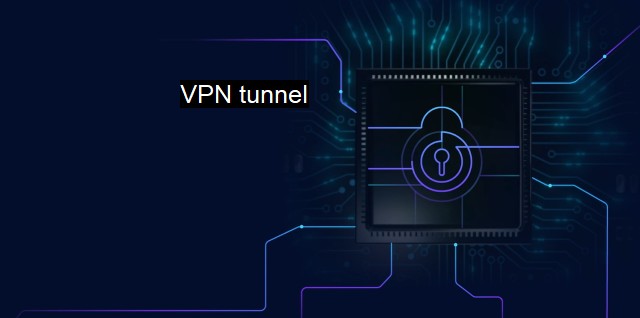What is VPN tunnel?
Securing Digital Connectivity: The Importance of Virtual Private Networks (VPN) in Cybersecurity for Organizations and Individuals
A VPN tunnel, standing for Virtual Private Network tunnel, plays a significant role in the field of cybersecurity and is often closely associated with antivirus protection. It essentially creates a 'tunnel' through the public network, over which private networks can transmit their data securely and secretly. Thoroughly understanding what a VPN tunnel is and how it functions, alongside antivirus software in enhancing cybersecurity, renders one cognizant of the importance of such protective measures in today's internet-driven world.In a simpler understanding, a VPN tunnel is like a protective shield or envelope that wraps around your internet traffic to keep it safe from any prying eyes. As we transmit data from one device to another or access data over the internet, our activities naturally become susceptible to unauthorized access or cyber threats. Here's where VPN tunnels step in. They protect the integrity and confidentiality of your data transmission, adding an extra layer of security to your online operations.
Cybersecurity threats are consistently evolving, and data breaches, hacker attacks, and intrusion attempts are continual challenges. A VPN tunnel decreases the likelihood of these happenings by hiding your IP address making it appear as if you are browsing from a different location, therefore obfuscating your tracks from potential hackers or attackers. Combining this set up with structured antivirus protection further solidifies your defense system against ill-intentioned cyberactivities.
The VPN hides your IP address by bouncing your network request through various servers around the globe. Data transmitted through a VPN tunnel is typically encrypted before it enters the tunnel and decrypted when it exits, ensuring that even if someone intercepts the data during transmission, it appears meaningless and indecipherable. This format of data encryption and the transfer is especially beneficial when you use unsecured Wi-Fi networks, preventing exposure of your data to malicious networks.
With the emergence of advanced VPN tunneling protocols such as IP Security (IPSec), Secure Sockets Layer/Transport Layer Security (SSL/TLS), and WireGuard, internet users can maintain their trust in VPN tunnels as an effective cybersecurity tool. These protocols contribute to protecting your transmitted data's integrity, securing it against various cyber threats or potential attacks.
Complementing and working hand in hand with the VPN tunnel is antivirus software. The purpose of antivirus programs is to detect, prevent, and remove malicious software programs or viruses from your computer systems. Though VPN tunnels might hide your information from being visible on the internet, antivirus software guards against malware or virus threats that might have bypassed the VPN tunnel. These two working hand-in-hand essentially deters unauthorized access and shields your sensitive information from myriad cybersecurity threats.
Put in context; if a VPN is like gating and anonymizing all external factors from a house, antivirus software is like securing the interior of the house from any internal threats. Therefore, it is always recommended, even when using a VPN, to ensure running active antivirus software for a more comprehensive and robust cybersecurity strategy.
VPN tunnels are undeniably a significant contributor to advancing cybersecurity landscapes. They provide a secure gateway for data transmission over public networks, ensuring the confidentiality and integrity of the transmitted information. Apart from online privacy, VPN tunnels help combat cybercrime by maintaining anonymity and creating a safer browsing environment.
a VPN tunnel is not a complete solution for ensuring cybersecurity but serves a specific purpose within the larger safety mechanism. When combined with effective antivirus management, IT professionals and ordinary consumers can navigate the virtual world, conduct business transactions, and even engage socially, with an increased level of protecting, best ensuring against ill-intentioned hackers and the increasing tide of cyber threats.

VPN tunnel FAQs
What is a VPN tunnel?
A VPN tunnel is a secure connection between two devices or networks that allows data to be transmitted securely over the internet. It creates a private network that encrypts data and protects it from cyber threats such as hackers and viruses.How does a VPN tunnel work to improve cybersecurity?
A VPN tunnel works by encrypting data traffic that is transmitted between two devices over the internet. This encryption ensures that hackers and other cyber threats cannot access the data. The encrypted data is then transmitted through the VPN tunnel, which acts as a secure tunnel, protecting the data from any malicious attacks or viruses.What is the difference between VPN tunnel and antivirus software?
VPN tunnel and antivirus software serve different purposes. A VPN tunnel is used to provide a secure connection between two devices or networks, whereas antivirus software is designed to protect devices from malware and other malicious software. VPN tunnel encrypts data and protects it during transmission, while antivirus software monitors and blocks any malware on the device.Is a VPN tunnel necessary for cybersecurity?
A VPN tunnel is not necessary for cybersecurity, but it is strongly recommended. A VPN tunnel provides an additional layer of security that protects data during transmission over the internet. It is particularly useful when accessing public WiFi networks, as these networks are often unsecured and can be easily hacked. So, a VPN tunnel is a great way to improve cybersecurity and protect sensitive data.| | A | | | B | | | C | | | D | | | E | | | F | | | G | | | H | | | I | | | J | | | K | | | L | | | M | |
| | N | | | O | | | P | | | Q | | | R | | | S | | | T | | | U | | | V | | | W | | | X | | | Y | | | Z | |
| | 1 | | | 2 | | | 3 | | | 4 | | | 7 | | | 8 | | |||||||